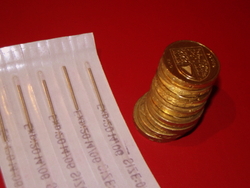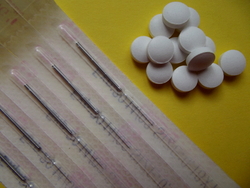An international collaboration which included some of the UK’s leading acupuncture researchers, has provided definitive evidence that acupuncture is effective for chronic pain. The collaboration gathered individual patient data for nearly 18 000 patients who took part in 29 high-quality, randomised, controlled trials of acupuncture for four chronic pain conditions: back and neck pain, shoulder pain, headache and osteoarthritis.
For each of the four conditions, true acupuncture was superior to control, and significantly more effective than usual care alone. The researchers conclude that this study provides the most robust evidence to date that acupuncture is a reasonable referral option for patients with chronic pain. The significant differences between true and sham acupuncture indicate that acupuncture is more than a placebo. However, these differences are relatively modest, suggesting that factors in addition to the specific effects of needling are important contributors to the therapeutic effects of acupuncture. They hope that their findings will inform policy-making aswell as encourage clinicians to recommend acupuncture as a safe and effective treatment.
(Acupuncture for Chronic Pain: Individual Patient Data Meta-Analysis. Archives of Internal Medicine, 10 September 2012.)



 American researchers have evaluated the usefulness of acupuncture for postoperative pain. They conducted a systematic review of the evidence, including fifteen randomised controlled trials of acupuncture versus a sham control, and found that at 8 hours and 72 hours after surgery, the acupuncture groups were using significantly less opioid painkillers (eg. codeine and morphine). Furthermore, acupuncture treatment was associated with fewer opioid-related side-effects, such as nausea, sedation, dizziness, itching and urinary retention.
American researchers have evaluated the usefulness of acupuncture for postoperative pain. They conducted a systematic review of the evidence, including fifteen randomised controlled trials of acupuncture versus a sham control, and found that at 8 hours and 72 hours after surgery, the acupuncture groups were using significantly less opioid painkillers (eg. codeine and morphine). Furthermore, acupuncture treatment was associated with fewer opioid-related side-effects, such as nausea, sedation, dizziness, itching and urinary retention.  An audit of acupuncture for pain across almost 6000 patients who received the treatment at a specialist pain clinic in Spain over a nine year period, revealed an average success rate of 79.7%. For the audit, “success” was defined as an improvement of at least 50% in five factors: pain intensity, pain frequency, consumption of painkillers, level of incapacity, and sleep disturbance. The highest success rate (93%) was achieved in patients with headaches. The authors conclude acupuncture is effective, carries with it no severe adverse events, and considerably reduces the consumption of analgesic and anti-inflammatory drugs.
An audit of acupuncture for pain across almost 6000 patients who received the treatment at a specialist pain clinic in Spain over a nine year period, revealed an average success rate of 79.7%. For the audit, “success” was defined as an improvement of at least 50% in five factors: pain intensity, pain frequency, consumption of painkillers, level of incapacity, and sleep disturbance. The highest success rate (93%) was achieved in patients with headaches. The authors conclude acupuncture is effective, carries with it no severe adverse events, and considerably reduces the consumption of analgesic and anti-inflammatory drugs.